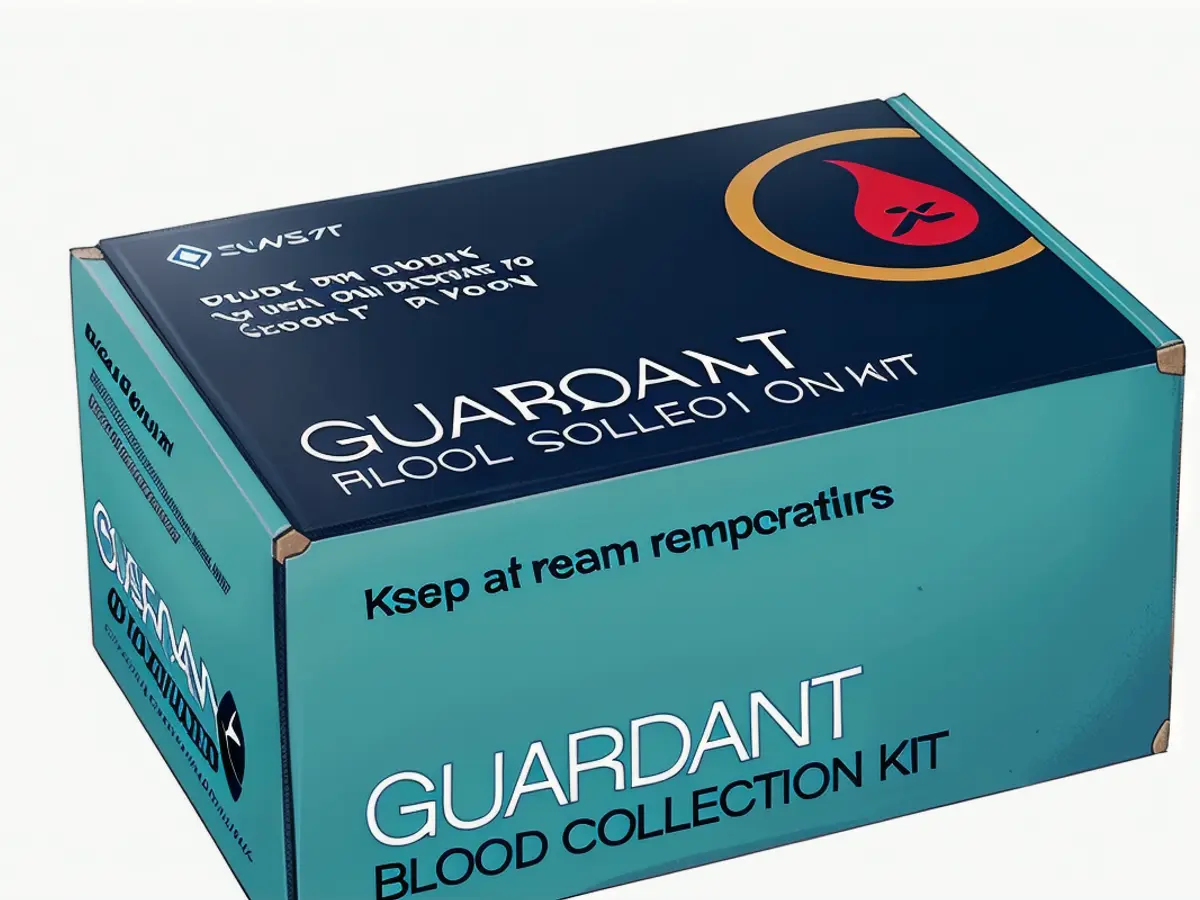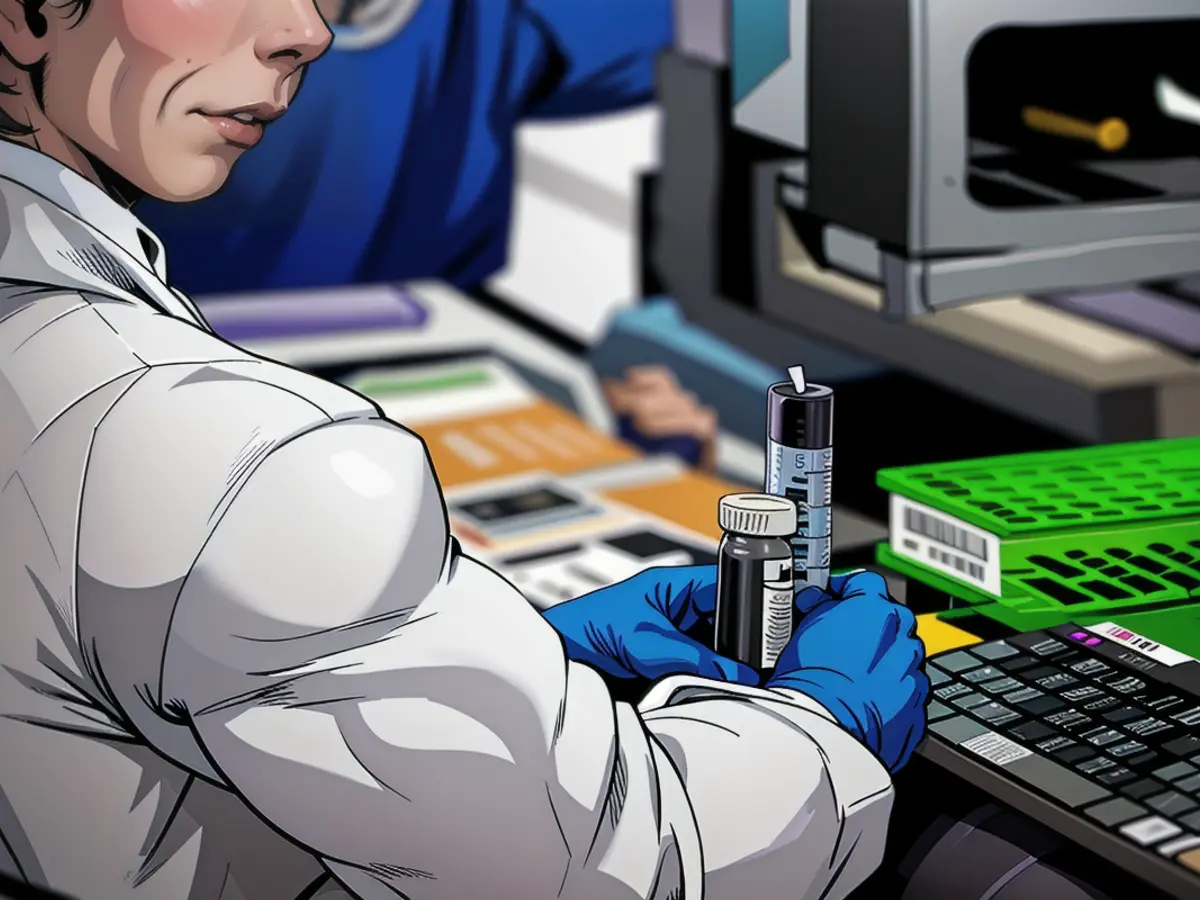Potential colon cancer blood test advances toward US FDA approval.
A straightforward blood test might soon become more accessible.
Palo Alto, California-based biotech company Guardant Health has filed for Food and Drug Administration (FDA) authorization of Shield, its blood test for detecting early signs of colorectal cancer. An FDA panel of experts will examine the screening test's data this week.
On Thursday, the FDA's Molecular and Clinical Genetics Panel of the Medical Devices Advisory Committee will discuss the advantages and hazards of the test and cast a vote on its safety and effectiveness. The panel's opinions will be forwarded to the FDA.
If Shield receives FDA approval, it will be the first blood screening test for colorectal cancer that complies with Medicare reimbursement guidelines, stated Dr. Craig Eagle, Chief Medical Officer at Guardant Health.
Presently, those at average risk of colorectal cancer have alternatives for screening, including a stool-based test undertaken annually or every three years, a traditional colonoscopy once every ten years, a virtual colonoscopy every five years, or a sigmoidoscopy procedure every five years, in which a flexible tube (endoscope) is used to inspect the lower part of the colon.
Although the FDA's approval is not strictly necessary for the Shield blood test's implementation, it could extend the test's availability and make it extensively insured as an alternative primary screening approach.
The Shield test, already accessible as a laboratory-developed test (LDT), would not replace these other screening options. Instead, according to Guardant, it would provide a noninvasive option that may encourage more people to undergo screening.
"Existing primary noninvasive screening choices are limited to stool-based tests," Eagle remarked in an email. "Our Shield blood test offers patients a convenient alternative that boasts a proven level of performance comparable to noninvasive tests."
Numerous research teams and enterprises have been developing straightforward blood tests for colon and rectal cancers.
"The argument is that a point-of-care blood test could substantially decrease the occurrence of advanced disease and save lives even if it has a lower capacity to hinder the disease," said Robert Smith, Senior Vice President of early cancer detection science at the American Cancer Society.
A blood-based test would not be able to identify problematic lesions or polyps in the colon or rectum, like a colonoscopy would. Nevertheless, visual examinations, such as colonoscopies or sigmoidoscopies, allow lesions or polyps that could possibly become cancerous to be seen and removed, thus preventing the disease.
"People prefer different screening options," said Smith. "You must provide them with a variety of choices."
Guardant's Shield test is proposed for colorectal cancer screening in people 45 and older at average risk of the disease, as per FDA meeting materials. The US Preventive Services Task Force suggests that screening for colorectal cancer begins at age 45 for individuals at average risk.
The test would not be advised for individuals with a family or personal history of the disease, and individuals who receive an "abnormal" test result utilizing Shield would be advised for a colonoscopy.
Since May 2022, following the launch of the lab-developed version of the Shield test, it has been used by over 20,000 individuals, with over 90% of those prescribed the test completing it, according to Guardant Health.
"Any test developer knows that they must receive FDA approval for their test to attain prominence," said Smith.
Smith intends to attend the FDA panel meeting on Thursday, but the advisers' decision won't instantaneously alter or influence the American Cancer Society's screening guidelines.
"The American Cancer Society usually looks for FDA approval at this level before we would incorporate a test into our guidelines," Smith noted.
"We're keen to know how the FDA regards this test, and subsequently regarding guidelines, I can't tell you what any group – including ours – will do, because it's a lengthy procedure that involves a thorough study of the FDA decision, as well as the implications," he said. "It takes some time."
How the test functions
Shield functions by identifying tumor DNA in blood specimens. A doctor must order the test and provide the necessary kit for their patient.
The test registered nearly 83% sensitivity and 90% specificity in a study published in March in the New England Journal of Medicine. Sensitivity signifies a test's capacity to correctly identify individuals with disease, classifying them as positive. Specificity defines its ability to correctly classify individuals without the disease as negative.
This study included over 7,800 people and forms part of the data to be discussed during Thursday's meeting by the FDA panel members.
"FDA seeks the Panel's input on whether the information submitted by Guardant is sufficient to support the safety and effectiveness of the Shield for its intended use," the meeting materials say.
Research discovered that around 83% of individuals identified with colorectal cancer through colonoscopy displayed a positive result on the Shield test, while approximately 17% experienced a false negative.
The test displayed a sensitivity rate of around 88% in identifying stages I, II, or III colorectal cancer. However, its sensitivity reduced to roughly 13% in detecting precancerous lesions.
Ninety percent of the research subjects without advanced colorectal cancer or precancerous lesions demonstrated a negative outcome on the blood test, compared to around 10% with a false positive.
Additionally, colorectal cancer affects around 150,000 individuals in the United States annually, causing more than 50,000 fatalities. It ranks second on the list of cancer-related deaths in the country. It is estimated that 75% of these fatalities occurred in individuals who did not adhere to their screening schedules.
The risk of developing colorectal cancer for the average person is roughly 1 in 23 for males and 1 in 25 for females, as per the American Cancer Society. Symptoms of colorectal cancer include shifts in bowel habits, rectal blood or blood in stool, cramping or abdominal pain, weakness and fatigue, as well as weight loss.
The incidence of colorectal cancer diagnoses among adults younger than 55 in the United States increased, starting in the 1990s. Presently, there is ongoing research on preferred screening methods for this disease, especially among younger individuals.
The FDA reported that in 2018, colonoscopies accounted for almost 96% of colorectal cancer screenings, but this decreased to less than 70% before the third quarter of 2023. On the other hand, the usage of DNA stool tests experienced a substantial hike between the second quarter of 2020 and the fourth quarter of 2023, representing 31% of all screenings.
Epic Research, a company owned by the healthcare software firm Epic, provided information on over 1.4 million initial colorectal cancer screening instances carried out through colonoscopy or DNA stool testing from 2018 to 2023.
Moreover, Dr. Jamin Brahmbhatt, a urologist and surgeon with Orlando Health and the past president of Florida Urological Society, expressed in an opinion piece for CNN in March that many people are reluctant to undergo colorectal cancer screening, citing their discomfort with stool-based tests, the preparation involved for procedures, and anxiety regarding colonoscopy exams.
He noted, "This apprehension could potentially lead to only around 60% of those eligible for colorectal cancer screenings maintaining their recommended tests. With theBlood test being granted approval by the US Food and Drug Administration, it is hoped that this blood test will encourage more individuals to undergo colorectal cancer screening."

Read also:
- No food or coffee for three days, just juice, juice, juice instead: a field report
- How to get rid of the flu if you have caught it
- Doctors warn of penis fractures and other injuries during the Christmas season
- Corona or flu epidemic? These pathogens are making us cough and sniffle right now
If the FDA approves Shield, it will be the first blood screening test for colorectal cancer that meets Medicare reimbursement guidelines. Even if Shield receives FDA approval, it won't replace other screening options such as stool-based tests, colonoscopies, or sigmoidoscopies.
The Shield test works by identifying tumor DNA in blood specimens, aiming to increase screening participation amongst individuals who are hesitant due to discomfort with stool-based tests, colonoscopy preparation, or anxiety regarding colonoscopy exams.
Source: edition.cnn.com








